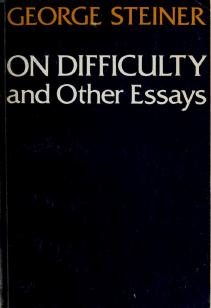On Difficulty by George Steiner

Author:George Steiner
Language: eng
Format: epub, pdf
Publisher: Open Road Integrated Media
6
Whorf, Chomsky, and the Student of Literature
1974
The two positions we are considering can be termed ‘monadist’ or ‘relativist’, and ‘universalist’. The monadist case holds that differences between languages outweigh similarities. That all men known to man use language in some form, that all languages of which we have evidence are able to name perceived objects or to signify action — these are undoubted truths. But belonging to the type ‘all members of the species require oxygen to sustain life’, they do not illuminate except in the most abstract, ‘trivially deep’ sense the actual workings of human speech. What matters are the fantastic diversities of grammatical form and semantic habit, what demands explanation is a complex but manifest history of centrifugal development. Our condition is, both obviously and in essence, that of mutual incomprehensibility after Babel. Between four and five thousand tongues are current on the earth. Several thousand more are known to have been spoken in the past. Any insight into the phenomenology of language must start from this enigmatic largesse and, finally, come back to it.
The universalist position asserts that the underlying structure of all languages is the same and thus common to all men. Dissimilarities between human tongues are essentially of the surface. Deep-seated structures and constraints generate and determine the forms of all grammars however singular or bizarre certain surface features seem to be. What is important is the understanding and formalization of these central generative elements; surface study is of primarily phonetic or historical interest.
Between these two poles of argument, there can be and there are numerous intermediary, qualified approaches. Neither position is maintained very often with absolute rigour. There are ‘monadic’ touches and nuances of linguistic relativism in the universalist grammars of Roger Bacon, of the grammarians of Port Royal, and even in the contemporary transformational generative grammars. There are, on the other hand, universalist notions in the relativism of Humboldt, of Sapir, and even of Whorf.
In their modern guise, moreover, both great lines of argument may be traced to a common source.
In 1697, in his tract on the amelioration and correction of German, Leibniz put forward the all-important suggestion that language is not the vehicle of thought but its determining medium. Thought is language internalized and we feel and think as our particular language impels and allows us to do. Tongues differ even more profoundly than do nations. They also are monads, ‘perpetual living mirrors of the universe’ each of which reflects or, as we would now put it, ‘structures’ experience according to its own particular sight-lines and habits of cognition. No two languages construe the same world. Yet; at the same time, Leibniz shared many of the universalist aims and hopes which had been, since Bacon’s plea for a ‘real character’ in the Advancement of Learning of 1605, so typical a strain in seventeenth-century thought. To the end of his life, Leibniz made suggestions toward a universal semantic system, immediately legible to all men. Such a system would be analogous to mathematical symbolism,
Download
This site does not store any files on its server. We only index and link to content provided by other sites. Please contact the content providers to delete copyright contents if any and email us, we'll remove relevant links or contents immediately.
| Booksellers & Bookselling | General |
| History of Books |
4 3 2 1: A Novel by Paul Auster(12354)
The handmaid's tale by Margaret Atwood(7727)
Giovanni's Room by James Baldwin(7301)
Asking the Right Questions: A Guide to Critical Thinking by M. Neil Browne & Stuart M. Keeley(5739)
Big Magic: Creative Living Beyond Fear by Elizabeth Gilbert(5723)
Ego Is the Enemy by Ryan Holiday(5391)
The Body: A Guide for Occupants by Bill Bryson(5065)
On Writing A Memoir of the Craft by Stephen King(4911)
Ken Follett - World without end by Ken Follett(4705)
Adulting by Kelly Williams Brown(4552)
Bluets by Maggie Nelson(4534)
Eat That Frog! by Brian Tracy(4499)
Guilty Pleasures by Laurell K Hamilton(4422)
The Poetry of Pablo Neruda by Pablo Neruda(4079)
Alive: The Story of the Andes Survivors by Piers Paul Read(4009)
White Noise - A Novel by Don DeLillo(3988)
Fingerprints of the Gods by Graham Hancock(3979)
The Book of Joy by Dalai Lama(3959)
The Bookshop by Penelope Fitzgerald(3827)
